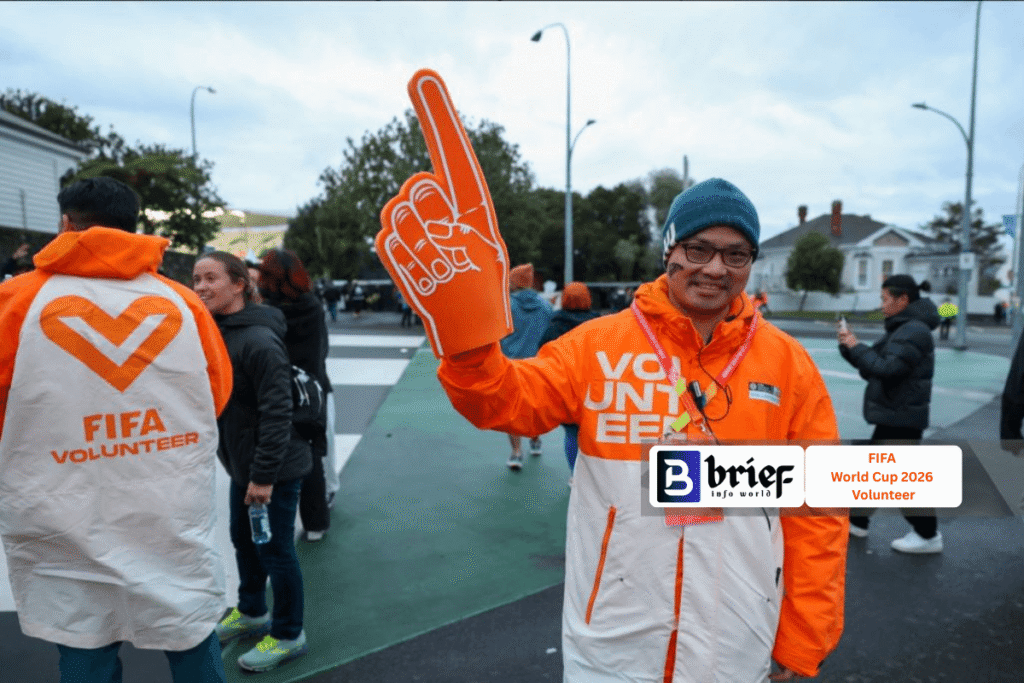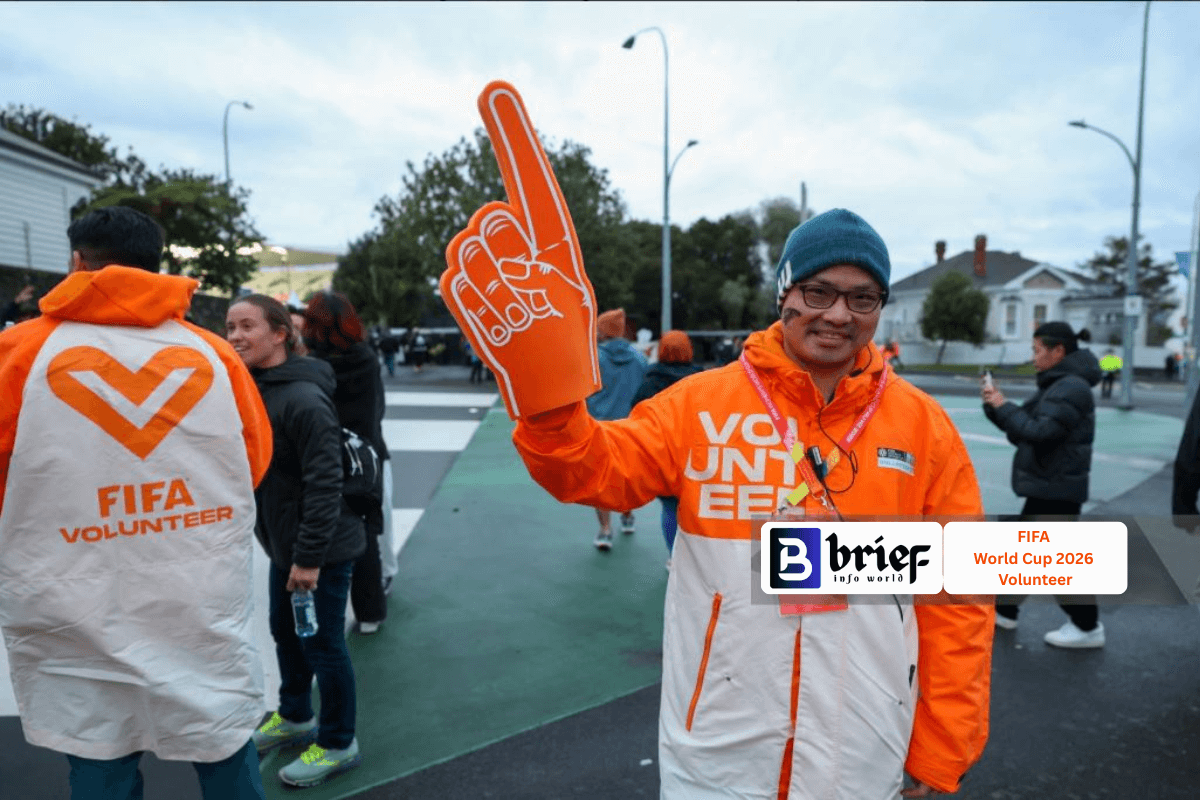
The Volunters FIFA World Cup 2026: Be the Heartbeat of the Game
The FIFA World Cup is more than football—it’s a global festival uniting millions in a shared love of the beautiful game. For the first time, the 2026 edition will be hosted across three nations—Canada, the United States, and Mexico—bringing unprecedented scale and opportunity. At the core of this monumental event? The FIFA World Cup 2026 Volunteer. They’re the smile at the gate, the guiding hand in stadiums, and the reassuring voice for fans navigating new cities. This is your ticket to becoming an essential part of a historic World Cup.
Why Volunteer at the FIFA World Cup 2026?
A Once-in-a-Lifetime Global Impact
Being a volunteer during a FIFA World Cup puts you at the intersection of history, culture, and passion for football. FIFA World Cup 2026 Volunteer play a vital role in making the show come to life, so you’re not just watching it.
Deep Cultural Exchange
With fans flocking from every corner of the globe, volunteering grants you access to languages, traditions, and stories you’d only otherwise encounter on travel shows.
Skyrocket Your Skills
Working in operations, hospitality, communications, logistics, or visitor services offers transferable skills—team leadership, language services, and crisis management—that look great on any resume.
Build Endless Connections
From FIFA staff and international teammates to fans who’ll remember you forever, your network will grow exponentially—personal and professional bonds forged in the World Cup furnace.
Free Events & Unique Perks
Volunteers typically receive event access, official gear, training, and certificates. Often, there are additional goodies—meet-and-greets, festival invitations, and behind-the-scenes glimpses.
Who Can Volunteer? You’re Probably Eligible

Broad Reach
FIFA invites hundreds of thousands of volunteers across all host cities. You can be:
- A high school or college student seeking internship experience
- A working professional aiming to contribute and grow
- A retiree or non‑working individual with time and passion
- A bilingual or multilingual speaker enhancing fan experience
Typical Requirements
Though exact criteria may vary by host nation and city, expect:
- Age: Usually 18+, though teen programs may allow younger participants
- Language: English essential; additional languages (Spanish, French) beneficial
- Availability: Must commit a specified number of shifts/training hours
- Visa/Citizenship: Generally required to be authorized to live and work in the host country
In all three countries, FIFA’s volunteer portal will outline precise eligibility conditions and selection criteria.
What Volunteer Roles Are Available?
Stadium & Event Operations
- Gate control: Checking tickets, welcoming spectators
- Seating usher: Directing fans to seats, assisting special‑needs attendees
- Crowd management: Helping to keep fans safe and orderly
Fan Engagement Areas
- Info hub guide: Providing directions, schedules, FAQs
- Fan zone activator: Assisting interactive games, cultural exhibits
Transportation & Logistics
- Airport/station ambassador: Supporting fans upon arrival or departure
- Shuttle coordination: Managing buses, trains, designated routes
Media & Communications
- Press support: Credential checks, photographer guidance
- Media center assistant: Info desk, interview coordination
Hospitality & Guest Services
- VIP liaison: Guiding dignitaries, sponsors, ambassadors
- Player liaison: Assisting teams, coordinating schedules (requires clearance)
Technical & Support Functions
- Translation/interpretation: Real-time language support
- IT help desk: Troubleshooting tech for press and staff
How to Apply—Step by Step

1. Sign Up on the FIFA World Cup 2026 Volunteer Platform
When FIFA launches the FIFA Worls Cup 2026 volunteer portal, visit the FIFA World Cup website, create your account, and begin your application. Expect early calls in late 2024 or 2025.
2. Complete Your Profile
Share your:
- Personal info (name, age, contact)
- Languages spoken
- Relevant skills and job history
- Preferred role(s) and location(s) (multiple cities/countries may be possible)
- Availability during the tournament
3. Pass the Screening
Allow time for FIFA or LOCs (Local Organizing Committees) to review, vet, and interview candidates via phone or online.
4. Attend Training
Once selected, you’ll undertake stadium-specific, media, or safety training—likely a mix of in-person and online. You’ll receive orientation schedules and resources.
5. Get Officialized
After training, collect your volunteer ID, official kit, and gear to identify you as part of the event family.
6. Start Volunteering!
During the tournament (June–July 2026), you’ll follow your assigned shifts, support fans, and be a part of something extraordinary.
The Volunteer Experience: Real Voices

“Walking into the stadium on Opening Day—knowing I helped hundreds of fans get in smoothly—was the most incredible feeling.”
—Ana, volunteer at 2018 World Cup
“I met journalists from Kenya, players from Saudi Arabia, and fans from Argentina. We shared meals, swapped stories—it felt like we changed the world for those two weeks.”
—David, press‑desk volunteer, 2022
💡 Expect camaraderie, long days, and the thrill of seeing global citizens come together. Be prepared: volunteer shifts can run from early morning until after the final whistle, and you’ll stay mentally agile in a fast-paced environment.
Tips to Maximize Your Volunteer Journey
Pick Roles That Fit You
Love languages? Consider translation. Enjoy logistics? Try transportation. Speak up for inclusivity? Opt for accessibility services.
Train Early & Widely
Take advantage of every session—online safety modules, in-person walkthroughs, and stadium tours. The more prepared you are, the more confident and effective.
Learn Key Phrases
Even basic greetings in multiple languages go a long way. In fan zones, “bienvenido”, “thank you”, “merci” can bridge gaps instantly.
Connect with Fellow Volunteers
Join official forums or social groups, attend meetups, get to know your teammates—and maybe form your own World Cup crew!
Document the Journey
Photos, journals, vlogs—capture your story! It’s great for socials and invaluable for your own memories and future career narratives.
Stay Safe & Hydrated
Especially in summer, match days may demand long hours in sun or rain. Bring sunscreen, a refillable water bottle, and layered clothing.
Be Adaptable
Schedules may change abruptly—be nimble, alert, and ready to pivot.
Volunteer Gear & Perks
Expect a full volunteer kit:
- Official uniform (shirt, jacket, hat)
- Credential/badge
- Training manuals and access guides
- Meal vouchers or access to staff catering
- Public transit pass (in host cities)
- Invitations to volunteer-only events
- Certificate of participation at the end
Plus:
- Free attendance at matches (subject to assignment)
- Souvenirs and memorabilia
- Networking events with FIFA, sponsors, ambassadors
After the World Cup: Beyond the Badge

Show It Off
Feature your experience on LinkedIn and your résumé—highlight operational coordination, high-pressure problem-solving, and intercultural communication.
Stay in the Football Family
Many volunteers at prior tournaments continued with major events like Champions League finals, Olympic games, or international friendlies.
Keep Friend Connections
Stay in touch with fellow volunteers and fans—your network now spans the globe.
Inspire Others
Share your journey via blogs, social media, or volunteer orientation panels to encourage future volunteers.
Cost, Time, & Commitment
Time Investment
- Application & interviews: few hours
- Training: 10–20 hours (online + in-person)
- Tournament: average 4–8 shifts (~6 hours each, often including evenings/weekends)
Costs Out‑of‑Pocket
- Transportation to host cities (unless covered)
- Meals (plus some free during events)
- Accommodation (volunteers often secure personal lodging; host committees sometimes offer discounted options)
Choosing a host city close to home (or your work/study zone) can help reduce costs and commute stress.
Application Timeline (Estimated)
| Phase | Approximate Timeframe |
| Volunteer portal opens | Late 2024 / Early 2025 |
| Application & interviews | Early‑Mid‑2025 |
| Selections announced | Late 2025 |
| Training launches | Late 2025 – Early 2026 |
| Volunteer deployment | June–July 2026 (tournament window) |
| Volunteer wrap‑up | Post‑tournament surveys & awards |
Stay plugged into FIFA’s official channels for exact dates.
How a FIFA World Cup 2026 Volunteer Becomes the Heartbeat of the World Cup
Welcoming the World
Volunteers are often the first and best cultural ambassadors fans meet. A warm smile, friendly greeting, or translation helps ease language and cultural barriers in foreign stadiums and transit hubs.
Guiding the Journey
From gate entry to seat directions to fan zone tips, volunteers keep the massive event flowing and worry-free, aiming for zero fan frustration.
Crafting Memories
You’ll be part of weddings proposed on the field, young fans meeting heroes for the first time, and families hugging after goals. These are the moments that linger.
Shaping Accessibility
Guiding persons with disabilities, supervising audio descriptions, or offering braille schedules—volunteers make global inclusion a reality.
Imagine: Your World Cup Day as a Volunteer Snapshot
06:00 — Wake up in your volunteer village/host‑city apartment.
07:00 — Uniform on, badge secured, coffee in hand
08:00 — Stadium ops briefing: key stadium notes, fan‑flow maps, safety updates
09:00 — Post at Gate 5, greeting arriving fans in multiple languages.
11:00 — Shift changes—direct a family with limited mobility to accessible plaza.
13:00 — Lunch break, chat with other volunteers and international fans.
14:00 — Assist a Spanish-speaking journalist to press seats.
16:00 — Unexpected stadium closure? Calmly redirect fans to fan zone.
18:00 — Help seat a VIP group for match entry.
20:00 — Watch the match kick off from the volunteer-only area.
22:00 — Support exit operations and transportation coordination
23:30 — Debrief: talk logistics, memorable moments, what’s next
00:00 — Ride the shuttle home, kit off, crash—fulfilled
FAQs—Humanizing Your Journey
Q: Will volunteers get to watch matches?
A: Generally yes, depending on your role. Volunteers often receive complimentary access or volunteer‐only seating—but you may also swap match attendance for shift duty. Ask about match‑viewing perks in your agreement.
Q: Can I choose which country/city I volunteer in?
A: Yes, you’ll indicate preferred host cities during application. Final assignments consider your location, availability, and event needs across the U.S., Canada, and Mexico.
Q: Is training mandatory—and is it free?
A: Absolutely mandatory—and 100% free. This ensures you’re ready and equipped to support fans safely and effectively.
Q: What if I already volunteered at 2022 or 2018?
A: Great! Prior experience is a plus. You can highlight roles, feedback, and leadership—may even be fast-tracked or awarded preferential placement for key roles.
Q: How are shifts scheduled?
A: Usually 4–8 hour blocks with breaks, morning–afternoon or afternoon–evening. A volunteer coordinator or digital portal will manage your personal schedule.
Q: Can I volunteer remotely?
A: Most roles are on-site, though you may be able to help virtually with communications or media logistics. However, the FIFA World Cup volunteer experience is best lived in person.
Q: What happens after the tournament?
A: You’ll receive a certificate or letter of recognition, plus official volunteer gear. You might even be invited to winding-down events like celebrations or networking gatherings.
Final Thoughts: Join the Global Football Family
Volunteering for the FIFA World Cup 2026 is more than a service—it’s your personal crossroads with history, culture, and football. Across three countries, hundreds of events, and millions of fans, your help helps create smiles, memories, and unforgettable moments.
If you’ve ever wanted to blend cultural diplomacy, operational hustle, and love for football into one life-changing experience—you’ve found it.
Go volunteer. Be the heart of the game.

Hi, I’m M Saif, a digital marketer with a strong focus on SEO and content writing. I help businesses improve their online visibility, drive organic traffic, and create engaging content that converts. With a results-driven approach, I work on strategies that not only boost rankings but also deliver real value to audiences.












Leave a Reply